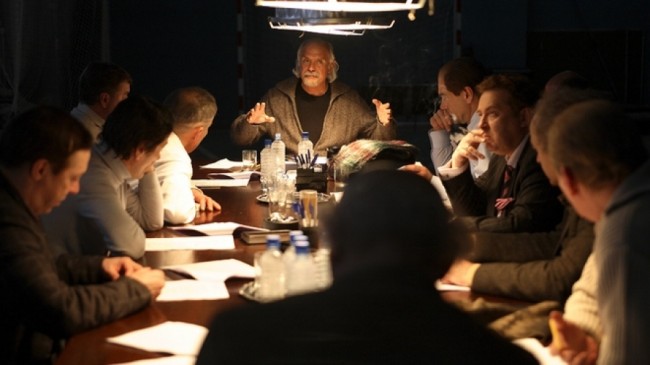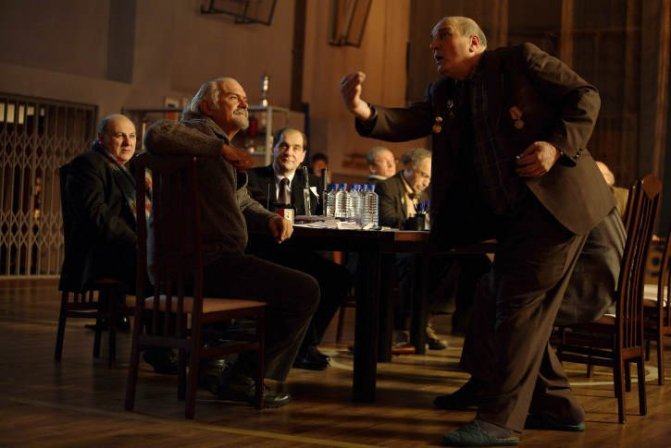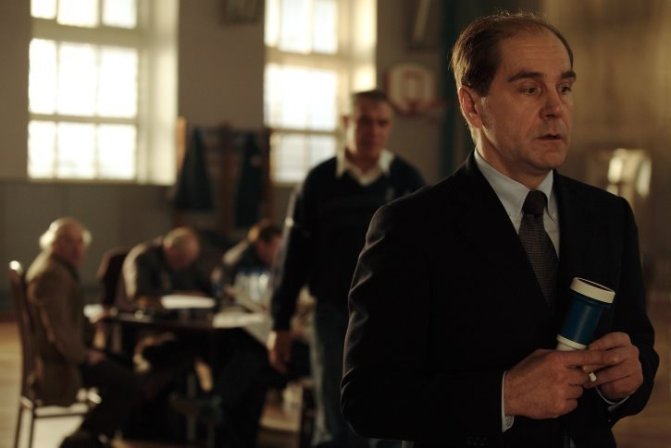By Mikhail Karadimov July 21st, 2015
If there were ever a group of people qualified enough to remake Sidney Lumet’s classic 12 Angry Men (57), it would be the Russians. The idea of the collective and how it abolishes the individual’s ability to decide, how we’re all numbers and plaintiffs and defendants—no names, no identity outside our legal worth—gels oh-so well with the Russian way of being.
Cue Academy Award-winning Russian director Nikita Mikhalkov and his 2007 remake 12 (07). Judging by his golden statue for Burnt by the Sun (94), Mikhalkov knows a thing or two about the Hollywood system. Especially when it comes to making his pictures. Mikhalkov’s remake is replete with Hollywood moments. From the score to the acting, to the unnecessary flash backs of a conflict—the one in Chechnya—that is barely explained (if at all) and manipulated into a note of lazy sympathy rather than a means to explore plot and/or character.
The movie’s ambitious—not in thought, but in execution. Nothing gets me going more than an ambitious disaster, as I think this film is. The movie veers away from the Lumet classic mainly in its approach to the case. The clues and pieces of incongruent evidence are still the same, we still have the old man witness, as well as the blind lady from across the street, and we still have the bit about the knife, but the case itself, as well as the defendant, is more fleshed out.
Well…it is and it isn’t.
Time and time again, the movie’s more exciting half—the scenes with the twelve (angrier) men—are forced to give way to flashbacks of the defendant’s life as an orphan on the streets of an unidentified Chechen town. Bodies stack up, people indulge in knife dances, a dog dies in the middle of a fire fight. But none of these flashbacks (a) address the actual case discussed, and/or (b) reveal who this kid is and why we’re following him, why we’re watching his every move locked up in his cell. It’s as if Mikhalkov knew that the Chechen nonsense would lend “importance” to his film, some topicality, some Oscar credibility.
Which is a shame since it’s the other half of the film—the deliberation—that’s worth watching.
Instead of cramming into a hot and steamy deliberation room and cutting off the possibility of any and all fancy camerawork, Mikhalkov sets his film in a school gymnasium. Apparently the jury room at the courthouse is still under construction—as is most of Russia. The performances in this film, dare I say it, are stronger than the original’s. Whereas the original film relies heavily on Henry Fonda’s provocation and follow through, his accessible charm and Big Brand name—as if he were the only hero of the bunch, the only one with the sense not to murder blindly—Mikhalkov’s film spreads out the love, giving each and everyone of his characters a moment to explain (or over-explain) what they’re all about, where they’re coming from. It’s over-the-top writing, very theatrical, very easy, especially since one too many of these men bare their souls through stories that are way too personal and long-winded to ever disrupt the flow of a real life deliberation; mind you: stories that are only loosely related to the film’s case.
The Henry Fonda figure, here played by Sergey Makovetskiy, falls by the wayside by the end of the flick. He’ll sometimes remind us of his existence with a verbal push here and there, but he never holds center stage, not for long. He’s only there to facilitate. Makovetskiy’s performance is smaller, sweatier, more desperate, like the final hairs that cling to his receding hairline or the feverish gesticulations of his hands. Without Fonda’s face radiating that All-American greatness, there’s more doubt, less sureness in the jury’s competence. Which is ironic, given the film’s slavish devotion to everything big and cinematic, from a shot that tracks a small bird that zooms in and out of the jury’s conversations, to a score that swells and plays pensively whenever the acting calls for it. There are dance numbers, flashy knife moves, unbelievable “war” scenes that reek of exhibitionism, etc. The film is big, it’s obnoxious, and its ideas are all over the place, but vapidly so. Big statements are made—theses without corresponding arguments—buzz words flash by, hot button topics, but nothing comes of it, none of it congeals into an assertive stance.
And yet, the ambition is fun to watch, so are the performances. If you want to see 12 Angry Men somehow out-Hollywood itself, here it is, about 5500-miles removed, but bigger and more sentimental than ever, and with an ending that is surprisingly new and different, an ending that—at long last—asks the big questions about Chechnya and our responsibility to those who have been ripped from their homes, who have had their homes and families laid to waste. Unfortunately, the question is asked unconvincingly and wraps the film up with a stylized moment of Tarantino-esque revenge that amounts to nothing but pomp.
But entertaining pomp.








